Interesting perspective relating the design & development to reality TV shows. Thanks for the tips and reminding me about criticism and feedback. Oh, and to be flexible like Stretch Armstrong! 🙂
Here’s How Reality TV Can Help You Become an E-Learning Pro
June 22nd, 2010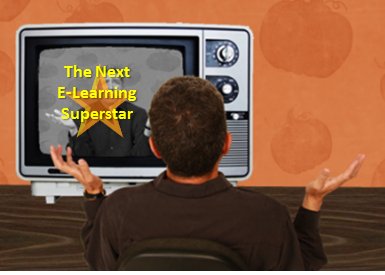
I’m intrigued by some of the reality television shows. I don’t care much for the trashy ones, but the ones where there are skilled people competing are interesting. I usually catch snippets of Project Runway or Top Chef since those are two of my wife’s favorites.
As can be expected, these shows typically have colorful characters that produce the drama. And some of the people can be arrogant and ruthless. The other day my kids were watching a cooking competition. I used the show as a teaching moment. We talked a bit about humility and being kind to others.
Not only are there teaching moments for the kids, there’s really a lot that can be applied to elearning. So here are five things that we can learn from reality television.
There’s never just one way to do something.
In many of the shows, the contestants are all given the same task and same materials. Then they’re asked to put their personal stamp on it. It’s interesting to see the different perspectives and creativity.
What strikes me is that even though they all start at the same place, how they approach the challenge is usually different and unique.
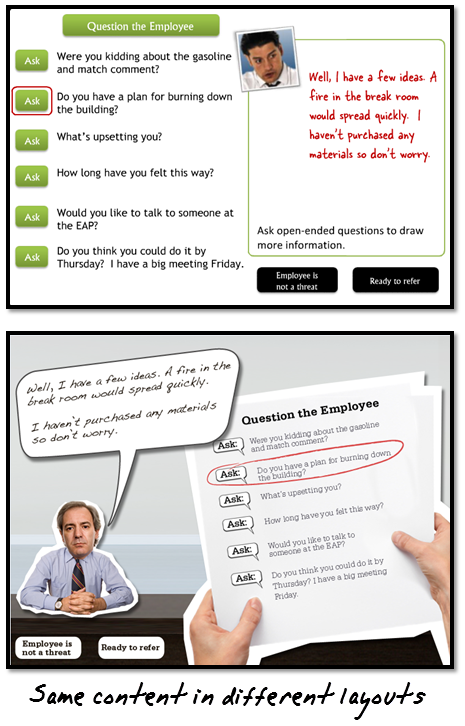
Key points:
- There’s more than one way to approach the course design. Don’t spend all your time trying to find the “right” approach. Besides, those who end up taking the course aren’t privy to the alternatives, anyway.
- Try to brainstorm and get feedback from others. Everyone has a unique perspective and something to add. On top of that, others see things we don’t. Most likely your project designs will be more diverse and better constructed if you can bring in an extra set of eyes.
Grow thick skin and learn to take criticism.
Most reality shows have some sort of judging component where a panel of experts critiques the contestants’ work. That part of the show is usually the most entertaining, especially if you have a judge like Simon Cowell.
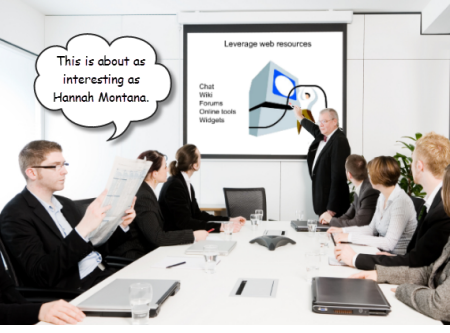
It never fails that as soon as a judge offers some criticism, one of the contestants will get defensive and offer a long-winded explanation of what they were trying to do. You know what? In most cases, no one really cares. Take the feedback, make the changes, and move on.
It’s natural to get defensive when their hard work is being torn apart. However, in most cases the judges are right on and offer the type of criticism that is fair and will only help the people get better.
Key points:
- Your job is to please the client. Listen to what they say. Avoid being defensive, even if you don’t agree. Humility goes a long way. Not only will you satisfy the client, you’ll also build a stronger relationship.
- Just to be sure, ask clarifying questions so that you find out exactly what it is they didn’t like and what recommendations they have to make it better. That’s different than being defensive.
Learn to give constructive feedback.
My kids were watching the Next Food Network Star. The goal of the show is to not just be a good cook, but to be a good cook who connects with people on TV. Some of them didn’t meet that goal.
What impressed me was the feedback given by Bob Tuschman, the VP of Programming. While he might have come off a bit insensitive because of his matter-of-fact manner, he got straight to the point and made sure that his critique was centered on meeting the ultimate objectives.
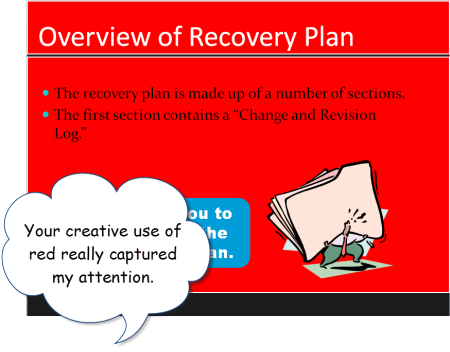
Because we’re so sensitive to not offend, it can seem harsh to give any type of corrective feedback. Some people take any criticism as a personal assault. However, in our industry it’s important to be able to give good, constructive feedback.
Key points:
- Understand your goals and give feedback targeted to meeting them. Don’t focus on the person; instead focus on the objectives and whether or not they were met. And why.
- Provide direction in your feedback. It’s not enough to point out that something’s good or bad. Be specific and focus on the desired action and result. For example, “The course seems slow,” doesn’t say much. What does “slow” mean? Something like this could be better. “Most screens had over 30 seconds of audio narration and there wasn’t much happening on the screen. Perhaps we need to trim the audio and change up the screen content a bit more.”
Design for others.
Most of the people who make it to the television competitions already have some sort of creative talent. Otherwise they wouldn’t be on the show. The challenge for them is to focus on how others can benefit from their skills and less on how they’re a gift to humanity.
This is really evident in a show like Project Runway. Often the fashion designers flounder because they place so much emphasis on their creativity that they lose sight of the objective to please someone else. The ultimate goal is to marry their creative skills with a marketable product.
Key points:
- Your success hinges on the success of others. Focus on the customer’s needs and deliver a course that helps them succeed.
- When it comes to elearning, the more learner-centric your course is the more likely it is that you’ll succeed.
Be flexible and willing to learn.
There’s usually some contestant who struggl
es early on, but in each round makes adjustments to get better. It’s impressive when a person can dismiss the need to justify their work and instead incorporate the criticism from the judges to give it a better go the next time.
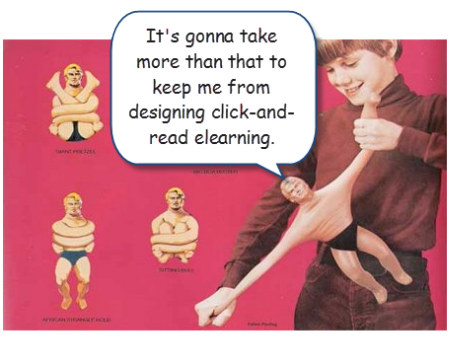
Success in life is less about getting it perfect and more about the adjustments you make along the way. My guess is that successful people can probably list a lot more failures than they can successes.
Key points:
- Put yourself in a position to be critiqued. Find a mentor who can give you good counsel. Or have regular team meetings where you review each other’s work. If you don’t have a team, jump into the user community and ask for feedback.
- Try something new. Don’t create twenty courses that are all essentially the same. Play around with ideas and try to incorporate them into your courses.
Granted a lot of the activity is staged and edited for entertainment value, but what makes reality television intriguing is that they place people in circumstances that stress them. We might not be on television, but we definitely face similar issues as we create elearning courses. Have a thick skin; be humble; and focus on others. That’s a winning combination that can only make your courses and relationships better.
Events
- Everyday. Check out the weekly training webinars to learn more about Rise, Storyline, and instructional design.
Free E-Learning Resources
 |
 |
 |
|
Want to learn more? Check out these articles and free resources in the community. |
Here’s a great job board for e-learning, instructional design, and training jobs |
Participate in the weekly e-learning challenges to sharpen your skills |
 |
 |
 |
|
Get your free PowerPoint templates and free graphics & stock images. |
Lots of cool e-learning examples to check out and find inspiration. |
Getting Started? This e-learning 101 series and the free e-books will help. |
14 responses to “Here’s How Reality TV Can Help You Become an E-Learning Pro”
Thank you for the tips! I can relate them, especially those in regards to giving and taking feedback, to my day-to-day position. Also, thank you for relating e-learning to reality TV, something that most of us can actually relate to. Your humorous references really make learning fun!
I like yout attitude on how to learn from anything that’s around us – even reality tv. I’ll try that too. Thank you!
How do you do the “cut out effect”? (I mean the person sitting at the desk on the second layout version of “Question the Employee”)
Greetings from Berlin, Germany
Dave
I like the way you think Tom! I wrote a similar blog post awhile ago after watching my first season of Project Runway.
“Success in life is less about getting it perfect and more about the adjustments you make along the way”. I absolutely share your life philosophy, Tom. That’s what learning is all about. Thank you so much for this post: not only a tip for elearning design but a lesson for life!
[…] See the article here: Here’s How Reality TV Can Help You Become an E-Learning Pro » The Rapid eLearning Blog […]
[…] Here’s How Reality TV Can Help You Become an E-Learning Pro […]
Very good posting. Especially with regards to accepting criticism. I tend to work alone on projects, this lends itself to a high degree of sensitivity over the finished product. Being open to input from others is something I always need to remind myself of. Thanks for the reminder!
Hi Tom,
Thanks for putting another perspective to designing elearning courses. It just shows that one thing we definitely need to develop is to keep our eyes, ears and brain open to every thing in daily life. This will help us be creative and incorporate innovation in the way we design our courses. In my wildest dream i wouldnt have been able to connect Reality TV and elearning courses! But you did and that has made all the difference.
Thanks once again!
Thanks Tom for the Link to the “Cut Out Tutorial” 🙂
[…] I’m intrigued by some of the reality television shows. I don’t care much for the trashy ones, but the ones where there are skilled people competing are interesting. I usually catch snippets of Project Runway or Top Chef since those are two of my wife’s favorites. As can be expected, these shows typically have colorful characters […] Original post […]
[…] […]
Thank you for this post. I like the competition reality shows and now I know that I can look for tidbits to take back into my working life.
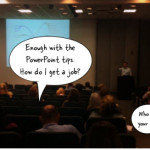





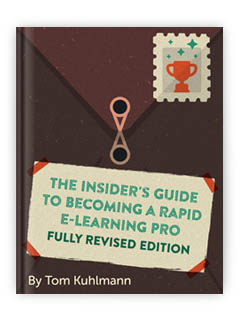


0
comments